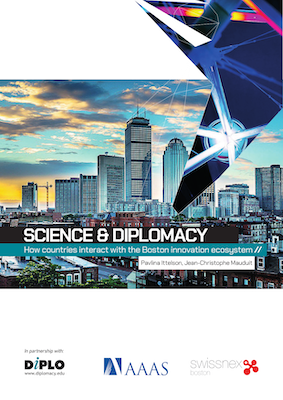Author: Vid Nukala
Traversing biomedical science, technology & innovation, policy, and diplomacy
2022
Note: This article is a part of the publication ‘Science diplomacy capacity development: Reflections on Diplo’s 2021 course and the road ahead’
Throughout my career, I have been drawn to international collaboration and cooperation in the scientific enterprise—what has recently been termed ‘Science Diplomacy’. This is perhaps due to my realisation that scientists predominantly work in international teams, whether they are within, across, or without borders. Yet, they can have a significant impact on what we know about the human body and mind, nature, and the universe, and how we see and shape the society around us.
Curiosity-driven open-sky research, or development towards specific goals, have given us the internet, vaccines, the international space station, but also the nuclear bomb. Most pressingly, the COVID-19 pandemic, conflicts over natural resources, climate change, and other UN sustainable development goals (SDGs) of Agenda 2030 continue to impact and are impacted by Science Diplomacy.
The purpose of Science Diplomacy is manifold. During times of peace, it could foster bilateral or multilateral accords and cooperation on mutually agreed interests on land, under water, or in space. It also keeps communication-channels across opposing sides open, or provides refuge to scientists escaping conflict. Science Diplomacy, when linked to SDGs, can increase the quality of life in developing countries through funding, technology transfer, or capacity building. When the ramifications of dual-use research are fully taken into account, it could help prevent human-made accidental or intentional catastrophes.
Over the past 15 years, working in academia, not-for-profit, philanthropy, and government (bilateral and regional) in Indian, U.S., and European ecosystems, I have been a ‘boundary spanner’ traversing biomedical science, technology & innovation, policy, and diplomacy (STI-Pol-Dip). Surrounded by biomedical STI and health diplomats, I interact with governmental and non-governmental actors, understanding how they influence each other, and work on the policies and processes to operationalize international cooperation.
In advancing global health within SDG 3, I have had the opportunity to work on emerging and converging biomedical and health technologies, air quality and health, traditional medicine and access to medical products, global health security, and women in STEMM, among others, that cut across the SDGs. Much of this work falls under ‘diplomacy for science’ and ‘science for diplomacy’, to enable access to, promotion of, and influence for STI.
Building on these experiences, I am now keen on engaging the lifesciences community across countries with varying levels of maturity in their research and policy ecosystems. It is not only important for researchers to understand the utility of policy and diplomacy, but also to actively contribute to the issues that impact their work and the world. I intend to draw upon the significant repository of knowledge and expertise within this community, while ensuring diversity and inclusivity in participation. Anticipation of STI informs and helps us prepare for optimal Pol-Dip responses. Therefore, incorporating foresight studies, landscape reviews, as well as analyses of ethical, legal, and social issues of emerging and converging STI into ongoing and future policy work is essential.
A key component would be capacity building for those among the community expressing an interest in STI-Pol-Dip. With an emphasis on equitable participation, I would like to enable them by equipping them with knowledge and skills of a science policymaker/diplomat through training workshops and immersion visits. By facilitating connections with policy and diplomatic institutions and networks beyond borders, I hope to contribute towards building a cohesive, resourceful, reliable, and engaged lifesciences community. This would firmly establish it as a key actor in the multilateral STI-Pol-Dip arena.
Strengthening the linkage among STI-Pol-Dip is essential to address global challenges. At the same time, the directionality of STI-Pol-Dip discourse—disproportionately from the ‘Global North’ to the ‘Global South’—its disparities in resources available for scholarship, training, or practice of STI-Pol-Dip, metrics of measuring success, and understanding its limitations, all merit further investigation.








